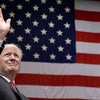Advertisement

WASHINGTON — President Trump is expected to name John Sullivan, the deputy secretary of state, to be the next ambassador to Russia, replacing Jon Huntsman Jr. as his liaison to Moscow, a senior administration official said. The post of ambassador to Moscow is a prestigious diplomatic position that is always challenging, but even more so after a two-year federal investigation into the Trump campaign’s possible ties to the Kremlin.
Mr. Sullivan has been confirmed once by the Senate. Should Mr. Trump move ahead with his appointment, he will face a new hearing.
Speaking on Tuesday to reporters in the Oval Office, Mr. Trump said that Mr. Sullivan “could very well be” his choice for ambassador to Moscow. The president added that Mr. Sullivan was “somebody that’s being put up” and that Secretary of State Mike Pompeo “likes him very much.”
The role is particularly delicate given the frenzy over questions about Mr. Trump’s links with Russia, dating to the 2016 campaign and his years as a businessman, and the president’s continued efforts to build a working relationship with President Vladimir V. Putin despite Russia’s aggressive actions around the world, including attempts to interfere with elections in the United States.
Mr. Sullivan, who has served as a senior lawyer in other government departments, would come to the post with limited diplomatic experience dealing with Moscow, which practices a notoriously canny brand of diplomacy.
Former government officials who have worked closely with the Russians saw Mr. Sullivan as an unlikely, if uncontroversial, choice for the post, most likely to exert limited influence over relations with Russia.
“The challenge for any political-appointee ambassador in Moscow is to be taken seriously by the Russians,” said Stephen Sestanovich, who served as the State Department’s ambassador at large to the former Soviet Union during the Clinton administration. Mr. Sullivan is “not known as a big player in the Washington policy process,” he said, nor is he widely known for his Russia expertise.
A genial and generally well-liked figure at the State Department, Mr. Sullivan has a conventional résumé for an establishment Republican. A practicing lawyer before he joined the Trump administration in early 2017, he served in the George Bush administration as a Justice Department official and under President George W. Bush as a Defense Department counsel and the No. 2 official in the Commerce Department.
Mr. Sullivan joined the State Department when it was led by Secretary Rex W. Tillerson, whom Mr. Trump fired in March 2018. His departure for Russia would allow Mr. Pompeo to install an ally of his choosing.
At his 2017 Senate confirmation hearing, Mr. Sullivan took a tough line toward Russia’s 2016 election interference and aggression toward its neighbors, such as its annexation of the Crimean Peninsula in 2014.
“I believe we have to be robust in our response to this intrusion into our democracy,” he said. “Interference with our political processes is simply unacceptable. It’s a profound threat to our way of life, and we have to respond as robustly as possible with all the means we have at our disposal.”
Russia has not been a central part of Mr. Sullivan’s portfolio, but last month he led a delegation of Trump administration officials who met with his Russian counterpart, Sergei A. Ryabkov, in Geneva to discuss arms control and other security issues. In December, Mr. Sullivan toured Central and Eastern Europe, where he pressed officials on Russia’s “destabilizing” and “malign activities,” according to a State Department news release about the trip.
As ambassador since October 2017, Mr. Huntsman maintained a low profile in Moscow. But he made quiet, if largely futile, efforts to thaw relations between Washington and Moscow before submitting his resignation this month. It is effective on Oct. 3.
During a meeting on June 28 with Mr. Putin at the Group of 20 summit in Osaka, Japan, Mr. Trump spoke in warm terms about the Russian leader. “We have had a very, very good relationship,” he said. “A lot of very positive things going to come out of the relationship.”
Although the report by Robert S. Mueller III, the special counsel, did not find that Mr. Trump’s 2016 campaign had conspired with the Kremlin, members of both parties in Congress are determined to maintain stiff sanctions on Moscow over its election interference detailed by Mr. Mueller and for Russia’s annexation of Crimea.
Mr. Sestanovich said that Mr. Putin’s government is frustrated by the continued hostility it faces in Washington, as well as by mixed signals from Mr. Trump’s own administration, where Russia hawks have resisted the president’s efforts to improve relations. He said the Kremlin is likely resigned to regrouping after the 2020 presidential election and waiting out the remainder of Mr. Trump’s administration, if needed.
“A lot of Russians will tell you they’ve written this administration off,” he said. “They don’t understand how to deal with it, they don’t know what the president means when he speaks. So why bother?”
Mr. Sullivan’s departure for Moscow would open the State Department’s deputy secretary post at a time when Mr. Pompeo is said to be considering a run for a Senate seat from Kansas. Were Mr. Pompeo to leave, his deputy would become acting secretary of state until a new top diplomat was confirmed.
A version of this article appears in print on , Section A, Page 12 of the New York edition with the headline: Pompeo’s Deputy Is Seen As Pick for Moscow Post. Order Reprints | Today’s Paper | Subscribe


